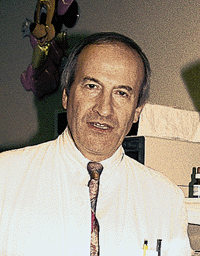Music therapy can provide an ideal link, but in a neonatal intensive care ward this can, of course, only be a so-called receptive music therapy – simply listening to healthpromoting music, not music making oneself. Throughout time, all civilisations have recognised the direct effect which music has on people’s soul or mood and on their disposition, and that naturally structured music has an equalising, healing effect which can bring about a state of spiritual equilibrium for the individual.
Similarly, it has been known from ancient times that, as well as a science, medicine is also an art form responsible for the harmony and the order of the ‘soul’.
Therefore, it is easy to see why this kind of medical application of music by ancient high civilisations was one of medicine’s most important corner stones. Today, this very traditional medical-musical approach is being propagated by the classical composer Peter Hübner. Here, based on modern scientific research and development, he is working together with medical experts from the most diverse of disciplines. We are also taking part in this research. With our tiny patients (premature babies, we have been able to see how breathing becomes calmer and more regular, breathing spaces less frequent and the thoracic respiratory movements smaller and more even, due to this harmonising music. The heart rate is also directly affected. To achieve this we play our ‘little ones’ (as we call them harmonic music. Here, we find that the Medical Resonance Therapy Music® by the composer Peter Hübner has a particularly calming and restorative effect.
It does not surprise me then, that medical researchers in Belarus have had very good scientific results with this music and are now wishing to exploit its restorative quality as one of the most important preventative aids for their country’s young victims of radioactive contami-nation.
The doctors have approached the music’s composer, Peter Hübner, and asked him to do his utmost to enable as many of their young patients as possible to receive sustained help from his Medical Resonance Therapy Music®. Thus, the sound creator Peter Hübner and his friends have started up an appropriate help campaign and they are looking to all of us for support.
Prof. Dr. med. Schachinger
